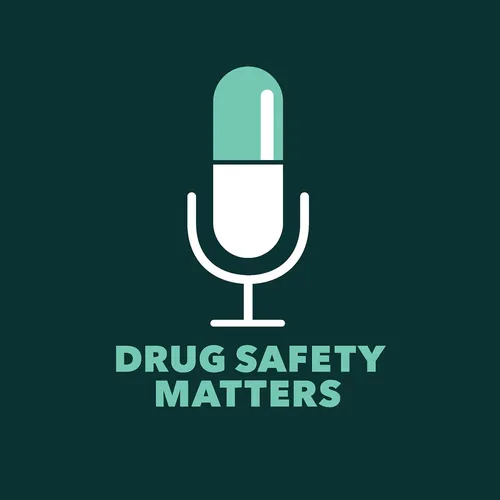
Drug Safety Matters
Drug Safety Matters brings you the best stories from the world of pharmacovigilance. Through in-depth interviews with our guests, we cover new research and trends, and explore the most pressing issues in medicines safety today. Produced by Uppsala Monitoring Centre, the WHO Collaborating Centre for International Drug Monitoring.
The views and opinions expressed in the podcast are those of the hosts and guests respectively and, unless otherwise stated, do not represent the position of any institution to which they are affiliated.
- Update frequency
- every 34 days
- Average duration
- 30 minutes
- Episodes
- 56
- Years Active
- 2020 - 2025

#39 Putting children first on Patient Safety Day – Angela Caro-Rojas
Children deserve the safest possible healthcare, yet they remain one of the most vulnerable patient populations when it comes to medicines safety. Ahead of World Patient Safety Day on 17 September, w…

#38 Patient perspectives in PV: a fireside chat at the ISoP mid-year symposium
This special episode was recorded at the mid-year symposium of the International Society of Pharmacovigilance (ISoP), 14–15 May 2025. Held in Uppsala, Sweden, the theme of the symposium was Improving…

#37 Beyond numbers: quality in ADR reporting – Henry Zakumumpa
Spontaneous adverse event reporting from healthcare professionals and patients is a cornerstone in pharmacovigilance systems. Unfortunately, it is a well-known issue that only a fraction of events is…

#36 Pregnancy-related pharmacovigilance – Levente Pápai, Lovisa Sandberg & Sara Vidlin
There are many reasons why use of medical products during pregnancy requires special attention. First and foremost, we want to be sure that the medicine is as safe as possible for both the pregnant p…

#35 Veterinary pharmacovigilance, part 2 – James Mount
Human and veterinary pharmacovigilance (PV) share many goals, challenges and approaches. But there are also significant differences, such as the numerous animal species that veterinary PV needs to ta…

#34 Veterinary pharmacovigilance, part 1 – James Mount
Human and veterinary pharmacovigilance (PV) share many goals, challenges and approaches. But there are also significant differences, such as the numerous species and breeds that veterinary PV needs t…

#33 Narrative fields and signal assessors, an exploratory study – Joana Félix and Alem Zekarias
While structured data elements such as patient identifier, medicine name and reaction, are fundamental for adverse event reporting, they may not capture all relevant details. This is where the narrat…

#32 Pharmacovigilance in older adults – Giovanni Furlan
Medication-related-harm (MRH) is especially prevalent in older adults due to changing physiology as the body ages, increased frailty, and the incidence of polypharmacy in this patient group. Giovanni…

#31 A guide to reporting disproportionality analyses – Michele Fusaroli and Daniele Sartori
Disproportionality analyses are a mainstay of pharmacovigilance research, but without clear guidelines, they often lead to confusion and misinterpretation. Enter the READUS-PV statement: the first-ev…

Uppsala Reports Long Reads – Weeding out duplicates to better detect side effects
Duplicate reports are a big problem when it comes to signal detection, but with the help of machine learning and new ways of comparing reports, we may more effectively detect them.
This episode is pa…

Uppsala Reports Long Reads – Ensuring trust in AI/ML when used in pharmacovigilance
Ensuring trust in AI is vital to fully reap the benefits of the technology in pharmacovigilance. Yet, how do we do so while grappling with its ever-growing complexity?
This episode is part of the Upps…

#30 Preventing and reporting medication errors – Rabat CC & UMC
Look-alike medicines, unclear communication and distractions during administration – medication errors may occur for many different reasons. They all have in common that they are unintended mistakes …

#29 When medicines change our behaviour – Michele Fusaroli
Medicines can affect our personality in positive ways, but they may also lead to destructive behaviours that can damage our relationships, finances, and overall quality of life. Michele Fusaroli from…

#28 Catching black swans – François Montastruc
Serious and unexpected adverse drug reactions – the ‘black swans’ of pharmacovigilance – can place enormous strain on safety monitoring systems. Drawing examples from the COVID-19 pandemic, François …

#27 When drugs damage the liver – Rita Baião
The liver is the primary site for drug metabolism in the body, but it can be severely damaged by medicines or their toxic compounds. Rita Baião from the North Lisbon University Hospital Center review…

#26 What's trending in pharmacovigilance? – Angela Caro-Rojas
What did the drug safety community achieve in 2023 and how will the field develop in 2024? As the year comes to a close, we asked Angela Caro-Rojas, president of the International Society of Pharmaco…

#25 A week in the name of medicines safety – part 2
To mark #MedSafetyWeek, which took place from 6–12 November, we’re releasing a special two-part episode on pharmacovigilance communication campaigns. In this second part, we hear from three #MedSafet…

#24 A week in the name of medicines safety – part 1
To mark #MedSafetyWeek, which takes place from 6–12 November, we’re releasing a special two-part episode on pharmacovigilance communication campaigns. In this first part, we speak to Mitul Jadeja fro…

Uppsala Reports Long Reads – The colour of signals
Herbal remedies have been used for thousands of years to treat what ails us. Yet why do we still know so little about their potential side effects compared to modern medicines?
This episode is part of…

Uppsala Reports Long Reads – Empowering patients as partners
A patient's perspective can ensure safe medical care and lead to new insights that traditional research may overlook. But how do we best harness that perspective to improve patient outcomes?
This epis…